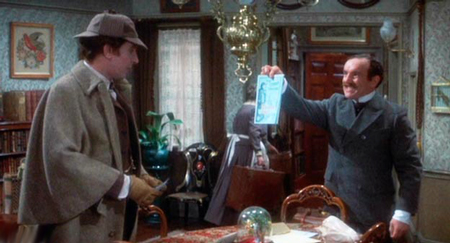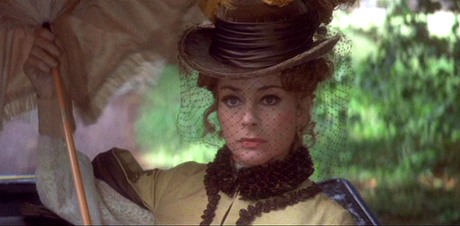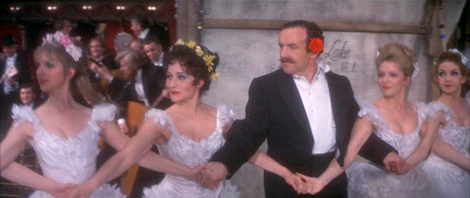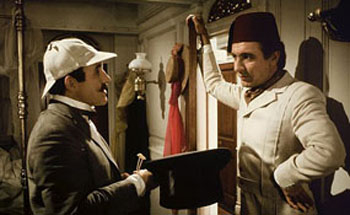Reviewed by Glenn Erickson
In the early 1970s, auteurist critics began a brief discussion of late-career movies made by great name directors, a category sometimes called 'old man's movies.' George Cukor, Howard Hawks and William Wyler were discussed, and even the relatively young Blake Edwards because some of his pictures featured aging stars and had similar elegiac themes. But by far the most impressive picture of this bunch, and one that needed to make no apologies for the age of its director, was Billy Wilder's The Private Life of Sherlock Holmes. Mangled before release and disastrously distributed by the once-faultless Mirisch Company and United Artists, Wilder's epic-length ode to the greatest of all consulting detectives might as well not have been released at all.
In 1972 it was included as the final title in an all-night Billy Wilder Marathon at the Los Angeles Film Exposition (Filmex). It screened last among several of Wilder's (at the time) harder-to-see pictures, like Emil and the Detectives and A Foreign Affair. The Private Life of Sherlock Holmes was then only two years old yet already just as obscure. Like Stanley Donen's Bedazzled and Arthur Penn's Night Moves, Sherlock eventually became known as a 'rediscovered' flop that everyone liked. Constantly in play in revival houses, it gained a reputation for its funny script and Miklos Rosza's lush romantic score. And there were rumors that the released version had been cut by almost a third. The film's production history makes it sound like a disaster, but it's not that at all.

When the great detective Sherlock Holmes (Robert Stephens) has no pending case to solve he bickers incessantly with his associate and biographer/promoter Doctor Watson (Colin Blakely). A wily Russian opera manager (Clive Revill) tries to buy Holmes' services as a stud for retiring ballerina Madame Petrova (Tamara Toumanova). Sherlock slips out of the deal by telling a lie that gets him into trouble with Watson. Then, amnesiac Belgian mystery woman Gabrielle Valldon (Geneviève Page) turns up at their door, propelling the pair into a complicated case involving kidnapped scientists, dead canaries, Trappist monks and Holmes' brother Mycroft (Christopher Lee), a spymaster for the foreign office. Sherlock, Watson and Gabrielle take the train to Scotland to find the source of the mystery, which proves to be almost too much for the brilliant sleuth.
Billy Wilder and I.A.L. Diamond found themselves struggling in the latter half of the '60s. The Fortune Cookie had fared well but the changing landscape of feature films and public taste threatened the commercial viability of their classically designed comedies. The pair embarked on a massive road show production that, with endless casting problems, took four years to bring to the screen. It was finally finished just as a series of costly flop road shows was bankrupting Hollywood. United Artists was suddenly no longer keen on releasing a three-hour movie about 1880s England, with no big stars.
Billy Wilder reportedly wasn't forced to cut Sherlock Holmes; he himself had become disenchanted with it. His movie was originally organized as three short adventure episodes and one 'main event'. Two of episodes were simply dropped, with a more elaborate opening, and a crucial flashback also trimmed away. The film as released is not some butcher job but Wilder's approved version. (more on the cut scenes below)

Robert Stephens broke with the 1970 image of Sherlock, which was still dominated by Basil Rathbone's pictures from thirty years before. Stephens was more like a true prudish-and-proper London gentleman, trading witty vaudeville routines ("Dust, Mrs. Hudson, is an essential part of my filing system!") with Colin Blakely's wonderfully genial Watson. Typically ahead of so-called progressive trends, Wilder and Diamond's hard look at the Doyle character addresses the fact that Holmes doesn't seem to have a love life. One of the lost, cut episodes seeks to explain his acute distrust of women; in the shorter released version the revisionist writers dance around the possibility that Holmes might be gay.
Wilder has always been an adult filmmaker, and after decades of winking at the audience with edgy jokes, he'd just gone through a string of increasingly ribald pictures. Kiss Me, Stupid hit such a raw nerve with the Catholics and the Production Code that UA had to release it out the side door, through an affiliate distributor. Their Sherlock Holmes was far more sophisticated and mature than the big-studio exploitation fare being pushed in the new ratings system -- Myra Breckinridge, The Magic Garden of Stanley Sweetheart. The nudity was nominal and the sex-related humor all verbal. Unfortunately, the picture was sold as if it were something shocking. An article in the short-lived Show magazine entitled The Private Sex Life of Sherlock Holmes. The family trade stayed home.
In the episode The Singular Affair of the Russian Ballerina, the question of Holmes' sexuality is a joke: "...Caprice of Mother Nature". The detective cagily dodges a direct demand for the truth from Watson: "So there'll be a little gossip about you in St. Petersburg." Holmes is obviously attracted to Gabrielle Valladon, the mysterious Belgian who confuses him with her husband while in a trance. He doesn't trust her, but for the wrong reasons, as it turns out. Holmes' instinct to resist the beguiling Valladon makes him seem strangely ineffectual and vulnerable, even when professing total confidence in himself. One critic compared Robert Stephens' moody inertia to Greta Garbo. Wilder's Holmes is a disillusioned romantic, an intellect who retreats defensively to a position of asexuality.

The film's main episode, The Adventure of the Dumbfounded Detective subverts the Holmes mythos, dissecting the character much as A.I. Bezzerides had criticized Mickey Spillane's Mike Hammer in Kiss Me Deadly. (spoiler) As does Bezzerides' Hammer, Wilder's Holmes also fumbles his big case, because what he takes for one of his Victorian parlor crimes is really the beginning of a new era of international espionage. Holmes' romantic foe Ilsa Von Hoffmanstahl never knows he has failed, for he's too cowardly to admit he was fooled by love. The romance of his life moves in a futuristic world where treachery is commonplace, where he doesn't fit in. Master spy Ilsa would never be content to knit by a fire while Sherlock smokes his pipe. The final bittersweet revelation is a shock that sends Holmes running for his seven-percent solution of cocaine.
Of all the 'old man directors', Wilder is the only one to embrace the spirit of the new Freedom of the Screen, creating sexually motivated characters without lapsing into exploitation. Viewers that haven't seen The Private Life of Sherlock Holmes are in for a big surprise, for it is a loving valentine to old-fashioned moviemaking. The photography of the lush Scottish landscape is beautiful and the scenes backstage at the ballet are a riot of soft colors and balalaika music. The script is a witty delight, with Wilder and Diamond decorating their mystery plot with a constant stream of arcane clues and character-driven jokes.
Well-known now from The Prime of Miss Jean Brodie, Robert Stephens played mostly character parts in films as diverse as Cleopatra, Travels with My Aunt and The Asphyx. He may not be as bankable a star as Wilder's first choice Peter O'Toole, but he's excellent in the role. The comedic dynamo Colin Blakely makes the jokes sparkle and the period farce work ("Holmes! You cad!"). Genevieve Page -- at 40 -- is a credible, sexy damsel in distress. Clive Revill (Avanti!) is a finicky Russian ballet manager ("Madame has read every story. Her favorite is Beeg Dog from Baskairveel"). In lively bits are Irene Handl as the patient landlady at 221B Baker Street, and Christopher Lee in his non-horror breakout role, perfectly cast as the insufferably pompous Mycroft.

None of these talents impressed the panicked distributors in 1970. After its numerous production problems -- including 47 extra shooting days due to Stephens' illnesses -- this borderline masterpiece was simply dumped with a campaign that appealed to nobody. It's a shame that Wilder lost faith in his own film, and that United Artists couldn't come up with a clever, compensating marketing gambit with which to spring it on the public. Even in this shortened form, it's a movie gem hiding in plain sight. 1
The KL Studio Classics Blu-ray of The Private Life of Sherlock Holmes is much the same as the HD copy shown occasionally on the MGMHD cable channel. I see dirt here and there on the title sequence and the colors are sometimes not perfect. As if the same flawed film element for the DVD was re-used, some dark scenes exhibit contrast fluttering, which is annoying. Other scenes are practically perfect. Private Life was filmed with plenty of filters that added a subtle haziness to many shots. The resolution of HD brings this quality out much better than the old MGM DVD from eleven years ago, that simply made shots look out of focus. The transfer maintains the slightly saturated colors but also the coldness of many shots. The colors in the ballet scene are almost as beautiful as in original Technicolor prints (Wrong! -- they were not Technicolor, and I assumed that they were). Some online review pages have already complained that this great picture deserves a more polished presentation, and there's no arguing with that.
The show was always in mono, so we do wish that it could have been remixed in stereo. Miklos Rozsa's music is nothing less than breathtaking, even in the montage of Watson's secret bag being opened in the bank vault. The movie is witty beyond measure -- nothing tops the uproarious backstage ballet sequence -- but Wilder also deals in sensitive subtleties. When the Wilder and Diamond main title credit comes up, with Sherlock's syringe pointing at the names, the feeling communicated is the same as the director credits in Hitchcock's Vertigo and Polanski's Repulsion.

The extras are repeated from the old DVD. Surviving film and audio, stills and script pages reconstruct the episodes and noted scenes deleted from the final cut. That the Mirisches didn't preserve the legendary unreleased road show version is a sad thing indeed. In the early '90s, Image and MGM's laserdisc included the two major missing scenes, but only parts of them: The Curious Case of the Upside-Down Room, a comic attempt by Watson to cheer up his bored friend, was audio-only; and The Dreadful Business of the Naked Honeymooners, where Watson takes a turn at playing detective, was picture-only. These major episodes are present here, with one illustrated with stills and the other subtitled to replace the missing audio. Unlike the old laserdisc, some minor nudity in the Honeymooners scene has been blurred out.
There were other alterations for which no film survived. In the lost opening Watson's grandson claims the box of precious artifacts left in charge of bank manager John Williams. A key flashback on the train to Inverness tells the story of the collegiate Sherlock's encounter with a dream-girl sweetheart -- who turns out to be a prostitute. This is the episode that critically warped Holmes' perception of women. These were barely covered on the laser, but the DVD uses script excerpts and a few newly found stills from the AMPAS. Robert Stephens playing age 19 has the same problem his wife Maggie Smith encountered two years later in the flashbacks in Travels With My Aunt: he can't possibly look young enough.
Some of the text accompanying and explaining the lost version seems to be 'borrowed' from the Sergio Leeman liner notes from the old laser. An interview with the editor of the film, Ernest Walter, taken from the laserdisc, is crudely taped and goes on forever. When he's talking on topic, Walter is a fountain of interesting information.

In an interview from 2003, Christopher Lee quickly covers his brief participation in the film, giving thanks again to Wilder. Then he drones on forever about the Doyle character and his roles in other Sherlock Holmes films. Lee can be a charming interview subject (see Anchor Bay's The Three Musketeers), but fan-oriented interviewers repeatedly allow him to wear out his welcome.
The one new item is billed as an 'additional audio sequence, the deleted epilogue scene'. Although the audio-only sample provided is almost six minutes long, we only hear one new dialogue exchange, between Dr. Watson and Inspector Lestrade. Why do we lament the missing scenes and connective material cut from Privare Life? Billy Wilder and I.A.L. Diamond's screenplays are so tightly constructed that anything missing hurts the final construction. Lestrade's little inquiry-interruption was meant to lighten what now is a sweet, but very sad conclusion. And we lovers of the film like to think that it would also set up a terrific sequel.
Fans of The Private Life of Sherlock Holmes will need no prompting to check out this new Kino/MGM Blu-ray; and others will be tempted after they see the deep discount prices being asked for it online. It's still a major favorite for me, as I remember seeing it for the first time at 4am at Grauman's Chinese Theater, at that Filmex marathon. It was one of the best sleepless nights of my life.
On a scale of Excellent, Good, Fair, and Poor,
The Private Life of Sherlock Holmes Blu-ray rates:
Movie: Excellent
Video: Very Good +
Sound: Very Good
Supplements: Featurette Christopher Lee: Mr. Holmes, Mr. Wilder; interview with editor Ernest Walter; deleted scenes, Additional Audio sequence: deleted Epilogue; original trailer
Deaf and Hearing Impaired Friendly?
YES; Subtitles: English
Packaging: Keep case
Reviewed:July 8 , 2014
Footnote:
1. Perhaps it would have been a long shot,
but my brilliant film marketing idea was to turn one or both of the lengthier deleted episodes into television specials that would help re-introduce the character of Sherlock Holmes to 1970 audiences spoiled by James Bond. Along with a lot of hype for the film, each special would have had its own self-contained comic mini-mystery.
Return

Text © Copyright 2014 Glenn Erickson
See more exclusive reviews on the Savant Main Page.
Reviews on the Savant main site have additional credits information and are often updated and annotated with reader input and graphics.
T'was Ever Thus.
Return to Top of Page
|

